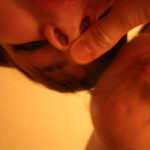I am afraid of money, especially when combined with health and medicine. Coming from a nation like Canada, it has been ingrained in the fibre of my being that healthcare should be completely accessible, read: free. As I embark on opening up a private practice as a naturopathic doctor, I am faced with a dilemma: I must charge my own patients for my services and, in this way, make my living.
This makes me afraid because, as mentioned above, I have a fear of money. I have seen money corrupt or become the main motivation for people to wake up in the morning. I have seen family members enslave themselves in certain lifestyles full of wants, rather than needs, that required large sums of money to maintain. I am also afraid of attracting only a certain kind of patient – those that can afford my services – and alienating a large demographic that naturopathic medicine could help. I don’t want to have a practice that is exclusive; I want to be able to reach a large number of patients and strive towards my goal of healing the world. What if no one can afford me? What if the people who can afford me don’t believe that I’m worth what I charge?
And in proper Cognitive Behavioural Therapy (CBT) fashion, from this dilemma surfaces a core belief: I am unworthy.
New practitioners struggle with unworthiness. After all, we are still learning and yet many expect us to be health experts. We emerge from school and enter into a society that has topical knowledge of health, especially natural health, but feigns depth of understanding. This can make us feel that we don’t know as much as we do. My relatives watch Dr. Oz and self-prescribe supplements. If they’re already taking fish oil, because they read about it on some health blog written by a second year ND student, why do they need a naturopathic doctor to tell them the same thing?
So, since CBT got me into this mess, let’s use it to facilitate the healing of my personal relationship with cash by examining some truths about the value of naturopathic medicine. I’m vaguely aware that this post has an uncomfortably self-aware, self-promontory tone, but my main goal is to convince myself, thereby coming to terms with my official début into this capitalist society. Hopefully it’s remotely entertaining and/or educational for the rest of you.
Naturopathic doctors are expensive. I have paid for 8 years of post-secondary education. The 4 years I was in naturopathic medical school; tuition alone was $20,000 a year. My OSAP debt accumulates a matcha green tea soy latte (unsweetened, of course)’s worth of interest daily. I owe other institutions and family members money. That’s just tuition. Now consider the fact that I wasn’t working during these 8 years. If I had gotten a job with a modest salary of say, $40-50,000 dollars a year, I could have made roughly $400,000 by now. I’ll stop, because this exercise is depressing me. But I think we all get the idea. So, financially, a naturopathic diploma is worth a truckload of cash, which can buy another truckload of self-prescribed supplements.
Being in practice is expensive. To get started we need electronic medical record software, a dispensary, acupuncture needles, linens, rent, licencing fees, malpractice insurance, association memberships, continuing education credits, website maintenance and hosting, and the list goes on. Being in practice can cost upwards of $200 a day. There are not many professions that pay to go to work each day. But not many professions put you in a position that allows you to heal the world… two sides to every coin (pardon the money pun).
NDs coming out of school are seasoned experts. Malcolm Gladwell, in his book Blink, famously tells us that it takes 10,000 hours to master something. Well, naturopathic medical school, with its 1200 hours of clinical training and 3000 hours of classroom training (not to mention the exams, studying, preceptoring, etc.) puts us at roughly half that number. Add in the numerous books I’ve read out of interest, the 300+ blog articles that I’ve researched and written and the fact that there isn’t a way to separate the practitioner from the medicine – “Doctor heal thyself” has become a mantra we regularly chant and put into practice – and you might just get up to 10,000 before graduation day. Or surpass it. I love health food stores, I do. But the minimum wage-earning employee recommending you the same brand of B-vitamins his sister takes just doesn’t have the expertise we do. You need a naturopathic doctor.
Medicine is not, and has never been free. I would not want to live in a country without universal healthcare. I believe that every citizen deserves equal treatment and equal access to quality health services. I believe that no one should receive priority based on their economic means rather than health needs. That being said, the medical system we support in Canada is quite expensive. It requires the input of hard-earned tax dollars. Some of these dollars support accessible emergency care, hospital stays, life-saving treatments and primary care. Some of them support poly-pharmacy: multiple prescriptions doled out to seniors. Some of these tax dollars are channelled into practices that do not promote health. Our healthcare system is not really health care; it doesn’t promote health, it manages disease. It should more appropriately be termed sick care. I don’t believe that health promotion like naturopathic medicine should be fee-for-service. I dream of a day where we are allowed to practice autonomously and offer those who need our services accessible care without charge. Until that day, sick care requires a lot of tax dollars and health care requires us to pay out of pocket. We need to pay for health care to avoid channelling all our resources into sick care. It’s the cold, hard truth.
Naturopathic medicine saves people money in the short and long-term. Whether it’s paring down your list of supplements to what you actually need, rather than what’s in vogue (Green coffee bean extract, anyone? I don’t think I’ve ever recommended it to anyone), to preventing and managing more expensive diseases down the road, I believe that an investment in seeing an ND will help save money. We empower you to take care of your own health. In the hands of an ND, you won’t need to visit your walk-in clinic for some ineffective and potentially harmful antibiotics the next time you get a cold; you’ll be taught how to manage common health concerns at home and feel in control of your body. Also, prescription drugs are expensive; I once paid $70 (that was after insurance covered half) for 6 migraine pills. I quickly figured out how to manage my monthly migraines naturally when I realized this system was unsustainable financially.
Naturopathic doctors are not in this to get rich. Due to the stress and lack of preparedness in setting up a business, a large percentage of NDs who graduate with the skills and knowledge we acquire are no longer practising. This is a harsh and sad reality. It means that the community is deprived of some very effective healers and the chance to be touched by what I know to be a powerful form of medicine; a true form of medicine. If I were motivated by money, I would have studied commerce at Queen’s, rather than science. I would have gotten my degree in 2008 and would be sailing my private yacht off the coast of Barbados right now. As it stands, my primary financial goal is to move out of my parent’s house and sustain myself financially while contributing to society and doing what I love in the meantime. And, if I achieve this goal, I still plan on continuing to purchase my clothing second-hand.
Money is a relative measurement. In the book The Wisdom of Insecurity by Alan Watts, money is described as “a mere symbol of wealth”. Watts tells us that money is a measurement of wealth, a representation of the real necessities that can be exchanged for it and that it is a mistake to give money itself value. There is nothing to be afraid of when it comes to money if all we see it as is a representation of needs. However, we live in a society where we don’t think twice about paying a few hundred dollars for clothes or shoes we don’t need, and then cringe when we see a bill for a service that has helped us move on a path to true healing. After investing in time with an ND, your life and health may never be the same. After paying for a pair of shoes or new haircut, your headaches and digestive issues are still going to be around. Your hair looks great, though. I’ll admit that.
Insurance companies don’t need the money. My insurance company once covered me for $20 of my $200 dentist appointment (in which I was told “everything looks great!”). If your health benefits cover naturopathic medicine you owe it to society as a whole to use up every last dollar of those benefits. Now is the perfect time to get started on that.
I would pay for a naturopathic doctor. How many used car salesman do you know who would personally buy the model that they’re selling? As a poor student I have seen naturopathic doctors, interns, chiropracters and massage therapists as a patient. I’ve gone to Body Blitz after back-breaking exams and have shelled out quite a bit of cash for supplements. The reason? There is value in spending money on these things; they work. So even though I am worried about coming up with the cash to replace my 4-year old computer, I don’t hesitate to fork over $50 for a bottle of quality B-complex vitamins.
Finding peace with making money involves a certain amount of hunger: becoming an ND and starting a practice is expensive. However, maintaining integrity as a doctor and putting the interests of my patients first is a priority for me. That’s why I have decided to offer patients supplements from my personal dispensary at Healthwave without mark-ups, at least for the time being. While many practitioners rightly and fairly choose to make part of their income off of vitamin sales, I have decided not to. Contact me to find out more.





